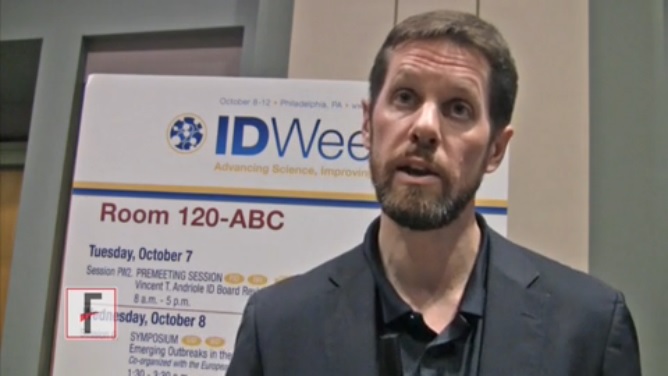User login
PHILADELPHIA– The swath cut by the Ebola virus in West Africa needs to be understood by Westerners in the context of the health care infrastructure available in West Africa, according to Dr. Robert Fowler, who worked as a consulting physician with the World Health Organization and health ministries in West Africa.
The health care infrastructure in West Africa is inadequate to support implementation of infection prevention and control and triage, including even the most basic standard precautions, such as access to soap and water, alcohol-based hand rubs, and sharps disposal boxes, safe needle handling, and rational use of personal protective equipment.
During a special session on the Ebola virus at the recent Infectious Diseases Week 2014, Dr. Fowler described infected patients lying outdoors because of a lack of beds, soiled personal protective equipment piled up where dogs and chickens could run through them, and a room where an Ebola patient hemorrhaged to death after being left untended for days.
Couple this with a limited ability to monitor patients or provide lifesaving rehydration therapy, and one begins to see how health systems in the United States, Canada, and Western Europe are far better prepared to handle the crisis than were their West African counterparts, according to Dr. Fowler of the department of critical care medicine, University of Toronto.
In a video interview, Dr. Fowler discussed the fears surrounding Ebola in the United States and Canada, and highlighted the realities of those countries’ capabilities to combat the outbreak.
Dr. Fowler reported no financial disclosures.
The video associated with this article is no longer available on this site. Please view all of our videos on the MDedge YouTube channel
PHILADELPHIA– The swath cut by the Ebola virus in West Africa needs to be understood by Westerners in the context of the health care infrastructure available in West Africa, according to Dr. Robert Fowler, who worked as a consulting physician with the World Health Organization and health ministries in West Africa.
The health care infrastructure in West Africa is inadequate to support implementation of infection prevention and control and triage, including even the most basic standard precautions, such as access to soap and water, alcohol-based hand rubs, and sharps disposal boxes, safe needle handling, and rational use of personal protective equipment.
During a special session on the Ebola virus at the recent Infectious Diseases Week 2014, Dr. Fowler described infected patients lying outdoors because of a lack of beds, soiled personal protective equipment piled up where dogs and chickens could run through them, and a room where an Ebola patient hemorrhaged to death after being left untended for days.
Couple this with a limited ability to monitor patients or provide lifesaving rehydration therapy, and one begins to see how health systems in the United States, Canada, and Western Europe are far better prepared to handle the crisis than were their West African counterparts, according to Dr. Fowler of the department of critical care medicine, University of Toronto.
In a video interview, Dr. Fowler discussed the fears surrounding Ebola in the United States and Canada, and highlighted the realities of those countries’ capabilities to combat the outbreak.
Dr. Fowler reported no financial disclosures.
The video associated with this article is no longer available on this site. Please view all of our videos on the MDedge YouTube channel
PHILADELPHIA– The swath cut by the Ebola virus in West Africa needs to be understood by Westerners in the context of the health care infrastructure available in West Africa, according to Dr. Robert Fowler, who worked as a consulting physician with the World Health Organization and health ministries in West Africa.
The health care infrastructure in West Africa is inadequate to support implementation of infection prevention and control and triage, including even the most basic standard precautions, such as access to soap and water, alcohol-based hand rubs, and sharps disposal boxes, safe needle handling, and rational use of personal protective equipment.
During a special session on the Ebola virus at the recent Infectious Diseases Week 2014, Dr. Fowler described infected patients lying outdoors because of a lack of beds, soiled personal protective equipment piled up where dogs and chickens could run through them, and a room where an Ebola patient hemorrhaged to death after being left untended for days.
Couple this with a limited ability to monitor patients or provide lifesaving rehydration therapy, and one begins to see how health systems in the United States, Canada, and Western Europe are far better prepared to handle the crisis than were their West African counterparts, according to Dr. Fowler of the department of critical care medicine, University of Toronto.
In a video interview, Dr. Fowler discussed the fears surrounding Ebola in the United States and Canada, and highlighted the realities of those countries’ capabilities to combat the outbreak.
Dr. Fowler reported no financial disclosures.
The video associated with this article is no longer available on this site. Please view all of our videos on the MDedge YouTube channel
AT ID WEEK 2014
